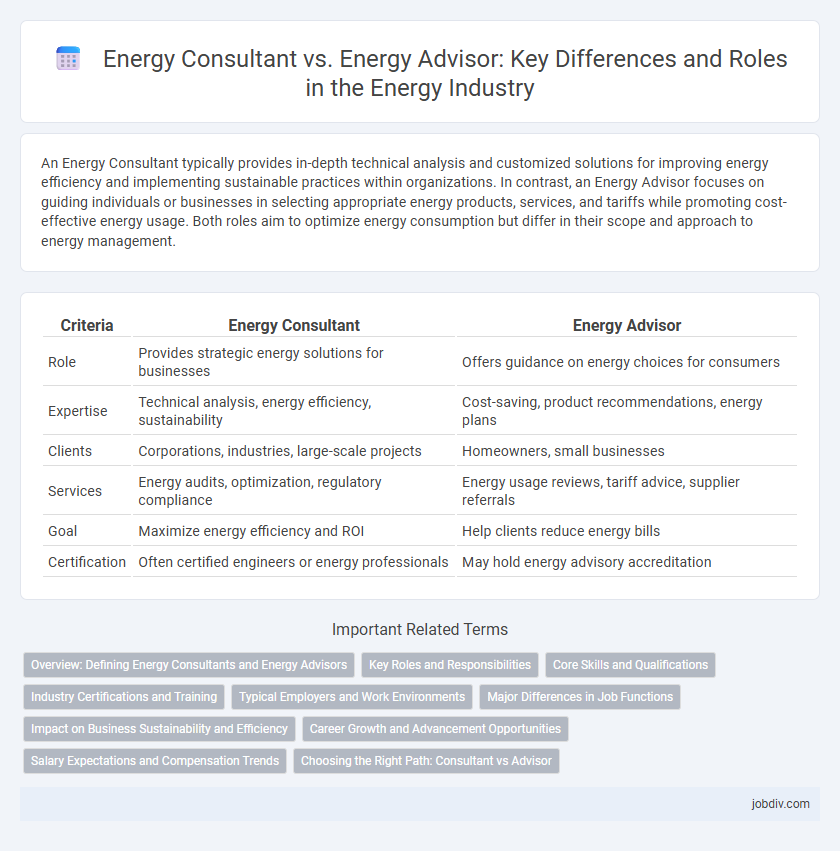An Energy Consultant typically provides in-depth technical analysis and customized solutions for improving energy efficiency and implementing sustainable practices within organizations. In contrast, an Energy Advisor focuses on guiding individuals or businesses in selecting appropriate energy products, services, and tariffs while promoting cost-effective energy usage. Both roles aim to optimize energy consumption but differ in their scope and approach to energy management.
Table of Comparison
| Criteria | Energy Consultant | Energy Advisor |
|---|---|---|
| Role | Provides strategic energy solutions for businesses | Offers guidance on energy choices for consumers |
| Expertise | Technical analysis, energy efficiency, sustainability | Cost-saving, product recommendations, energy plans |
| Clients | Corporations, industries, large-scale projects | Homeowners, small businesses |
| Services | Energy audits, optimization, regulatory compliance | Energy usage reviews, tariff advice, supplier referrals |
| Goal | Maximize energy efficiency and ROI | Help clients reduce energy bills |
| Certification | Often certified engineers or energy professionals | May hold energy advisory accreditation |
Overview: Defining Energy Consultants and Energy Advisors
Energy Consultants specialize in analyzing energy consumption patterns and developing strategic plans to improve efficiency and reduce costs for businesses and organizations. Energy Advisors primarily provide expert guidance on energy policies, regulations, and sustainable energy sources to help clients make informed decisions. Both roles aim to optimize energy usage but differ in their focus on technical assessment versus regulatory and advisory services.
Key Roles and Responsibilities
Energy Consultants analyze energy consumption patterns and develop strategic plans to optimize efficiency, reduce costs, and ensure regulatory compliance. Energy Advisors provide tailored guidance to businesses and homeowners on energy-saving measures, renewable energy options, and available incentives. Both roles require expertise in energy audits, policy evaluation, and sustainability practices to drive informed decision-making.
Core Skills and Qualifications
Energy consultants possess advanced analytical skills, expertise in energy market trends, and proficiency in energy management systems, often holding certifications such as Certified Energy Manager (CEM). Energy advisors typically emphasize strong communication abilities, knowledge of energy efficiency programs, and experience in customer-focused energy solutions, frequently backed by qualifications in environmental science or sustainable development. Both roles require a deep understanding of regulatory frameworks and renewable energy technologies, but consultants prioritize technical analysis while advisors specialize in client engagement and practical implementation.
Industry Certifications and Training
Energy Consultants often possess advanced industry certifications such as Certified Energy Manager (CEM) or LEED Accredited Professional credentials, reflecting rigorous training in energy efficiency and sustainability practices. Energy Advisors typically hold certifications like BPI Building Analyst or Home Energy Rating System (HERS) certifications, emphasizing residential energy assessments and compliance with local energy codes. The distinction in certifications highlights the consultant's focus on strategic energy management across commercial sectors, while advisors concentrate on practical, technical guidance tailored to homeowners and small businesses.
Typical Employers and Work Environments
Energy consultants primarily work for engineering firms, energy utilities, and large corporations, providing specialized advice on energy efficiency and sustainability projects. Energy advisors are often employed by government agencies, non-profits, and community organizations, focusing on public education, energy audits, and regulatory compliance. Both roles typically operate in office settings, with frequent site visits to industrial facilities, commercial buildings, or residential properties.
Major Differences in Job Functions
Energy consultants primarily analyze energy consumption patterns and develop customized strategies to optimize energy efficiency for businesses, while energy advisors focus on providing general guidance and recommendations to consumers or organizations on energy-saving options and renewable energy adoption. Consultants often conduct detailed audits, feasibility studies, and cost-benefit analyses to support large-scale energy projects, whereas advisors emphasize awareness-building, policy compliance, and incentive programs. The key difference lies in consultants delivering technical, project-specific solutions compared to advisors offering broader, advisory services tailored to individual or organizational energy goals.
Impact on Business Sustainability and Efficiency
Energy consultants analyze a company's energy consumption patterns and recommend tailored strategies to reduce costs and enhance sustainability. Energy advisors provide ongoing support and guidance to implement energy-efficient technologies and compliance with regulations. Their combined expertise drives significant improvements in business sustainability by optimizing energy use and minimizing environmental impact.
Career Growth and Advancement Opportunities
Energy Consultants typically possess specialized expertise in energy management and sustainability strategies, leading to higher demand in industries prioritizing efficiency and regulatory compliance. Energy Advisors often focus on consumer guidance and basic energy solutions, offering steady roles but with limited advancement compared to consulting careers. Career growth for Energy Consultants generally includes opportunities in project management, strategic planning, and higher salaries tied to technical certifications and industry experience.
Salary Expectations and Compensation Trends
Energy consultants typically command higher salaries than energy advisors due to their advanced expertise in project management and strategic energy planning, with average annual earnings ranging from $70,000 to $110,000. Energy advisors, often focused on client-facing roles and energy efficiency recommendations, generally earn between $50,000 and $75,000 annually, reflecting compensation trends influenced by experience and certification levels. The growing demand for sustainable energy solutions continues to drive competitive compensation packages, including bonuses and performance incentives, favoring consultants with specialized technical skills.
Choosing the Right Path: Consultant vs Advisor
Energy consultants specialize in technical audits, regulatory compliance, and implementing energy efficiency projects, providing detailed analysis for large-scale industrial or commercial clients. Energy advisors focus on consumer education, guiding homeowners and small businesses through energy-saving options, incentives, and sustainable practices. Selecting between an energy consultant and advisor depends on project complexity, scope, and whether a data-driven engineering approach or personalized guidance is needed.
Energy Consultant vs Energy Advisor Infographic

 jobdiv.com
jobdiv.com